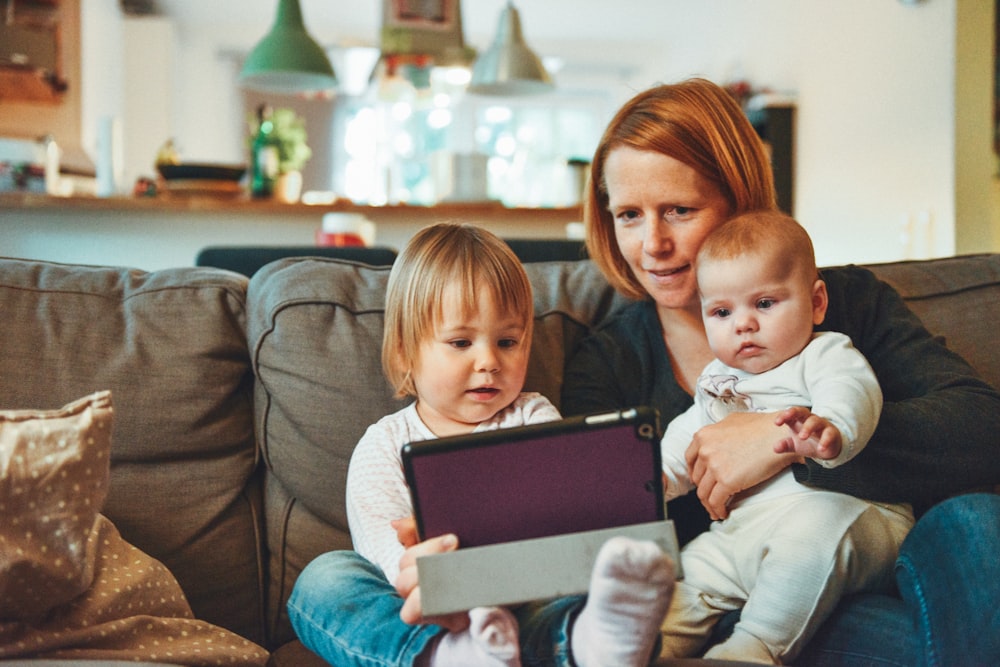- As the number of millennial parents increases, new and unique parenting trends also emerge. Here are the top 12 parenting trends in 2022!
As the new generation of parents grows in number, new and unique parenting trends are also starting to emerge. Here are the top 12 parenting trends in 2022 so far.
Read also: The Guide to Prepare Your Child for Home-Based Learning
Top 12 parenting trends in 2022
1 – Use of Technology
Technology has brought many conveniences to our lives, especially for busy parents. As much as some of us hate to agree, turning on their children’s favorite tv show or youtube playlist can keep them distracted for a long time. While they are obediently focused on fiddling with the devices, parents are able to get things done around the house, for example, doing the chores. Additionally, the use of technology has helped many parents to educate their children. There are many useful, kids-friendly applications for children to learn how to write, read and pronounce.
2 – Gender reveal parties
A gender-reveal party is a party held during pregnancy to reveal the baby’s sex to the expectant parents, family, and friends. There is a significant trend for such parties within these few years. Parents are fond of the idea of celebrating a new life in a new and different way from the past.
3 – Instagramming all the moments of your child
Modern-day parents love to capture all the moments of their children from the minute they are born. There are many Instagram accounts created for their children to document their life journey. Advancement in technology has made capturing moments easier and more convenient, with just a simple snap on the phone, you’ll be able to see the pictures almost instantly.
4 – Adapting to screentime usage
With the advancement of technology, children are exposed to mobile devices, the internet, and social media at a younger age. Back in the day, parents would limit their children’s screen time and disallow their children to watch tv, play video games and be on their phones for too long. However, the times have since changed, and everything is easily accessible online. Schools are incorporating more technology into their curriculum and encouraging online learning more than ever. Due to the pandemic, the usage of technology for educational purposes has since surged. Hence, limiting children’s screen time in this modern day will not be feasible anymore.
5 – Dads are taking over
As of 2017, the Singapore Ministry has announced for fathers of citizens’ children born on or after 1 January 2017, are entitled to 2 weeks of Government-Paid Paternity Leave. On top of that, over the years, fathers are taking an active role in taking care of their children. This translates to a trend of gender equality in terms of childcare within the family. The country and modernized mindset have helped fathers to step up and play a bigger role than they did in the past.
6 – Eating healthier
Over the years, we have learned about how to take care of our health, with supplements, exercise, and nutrients. It is also one of the increased parenting trends toward eating healthier food over the years. The global food market for healthier food brands is expected to increase by 6% and shows no signs of slowing down.
7 – Changes to parents’ work-life
Both parents take turns taking care of their children over the years. The workforce is also acknowledging and giving fathers an opportunity to take care of their children when needed to. Some companies are flexible in allowing employees to work from home if their families require additional support at home. Additionally, fathers’ participation in children’s life is as important and valued as mothers’.
8 – Exposing children to experiences
Parents understand the competitiveness the society will get over the years, hence they are exposing their children to many different experiences when they are young. Experiences like, learning a new skill, sport, or bringing them for an adventure. This will help their children to find their interests at a young age. It is also to prevent deprivation of these essential experiences. They get to be more educated and knowledgeable about these experiences when they are exposed to them at a young age which is always a good thing to possess.
9 – Older first-time parents
Over the years, the average age of first-time parents is gradually increasing. The average age of first-time parents is 30 now in Singapore, previously it was 21 to 26 years old. Survey results have reported that men and women in Singapore and remaining single for a longer period of time. Hence, causing men and women to be older when they have their first child.
10 – Accepting failure
Over the years, parents have shifted away from putting pressure on our children to succeed at a young age. In Singapore particularly, the pressure that children suffer from having to succeed is immense and intense. Though the culture and society in Singapore focus on the result, it is starting to change and shift. Parents are now more open to accepting the idea of ‘failure’ and understand that it is what helps their children become better individuals in the long run.
11 – Knowing kids better
Parents have a different take on educating their children now. Instead of reprimanding and lashing out at their children, parents are taking time to understand them.
Parents are becoming more susceptible to their children’s opinions, thoughts, and feelings. Compared to the old days, parents are often harsh and aggressive towards their children to make them understand and become better. However, over the years, millennials understand that this is not the only way to teach their children, allowing new parenting ways to emerge.
12 – Social media and unfiltered conversations
Children are now exposed to social media and the social media culture at a younger age. This is especially the case as society has evolved over the years. Parents hence have to look for a different way to educate their children now that social media is unavoidable – having unfiltered conversations. Parents are learning to create safe spaces for their children to discuss and talk about sensitive topics at home. Some of these unfiltered conversations can include very sensitive topics like body image issues, self-esteem, and mental health struggles.

Eleen Tan
I am currently a full-time student studying at a local university in Singapore while freelancing as a writer. I enjoy writing and sharing useful education-related tips with my fellow studying peers. During my leisure time, I enjoy doing creative arts and volunteering work. I am passionate about sharing my experience as a student! ☺



















